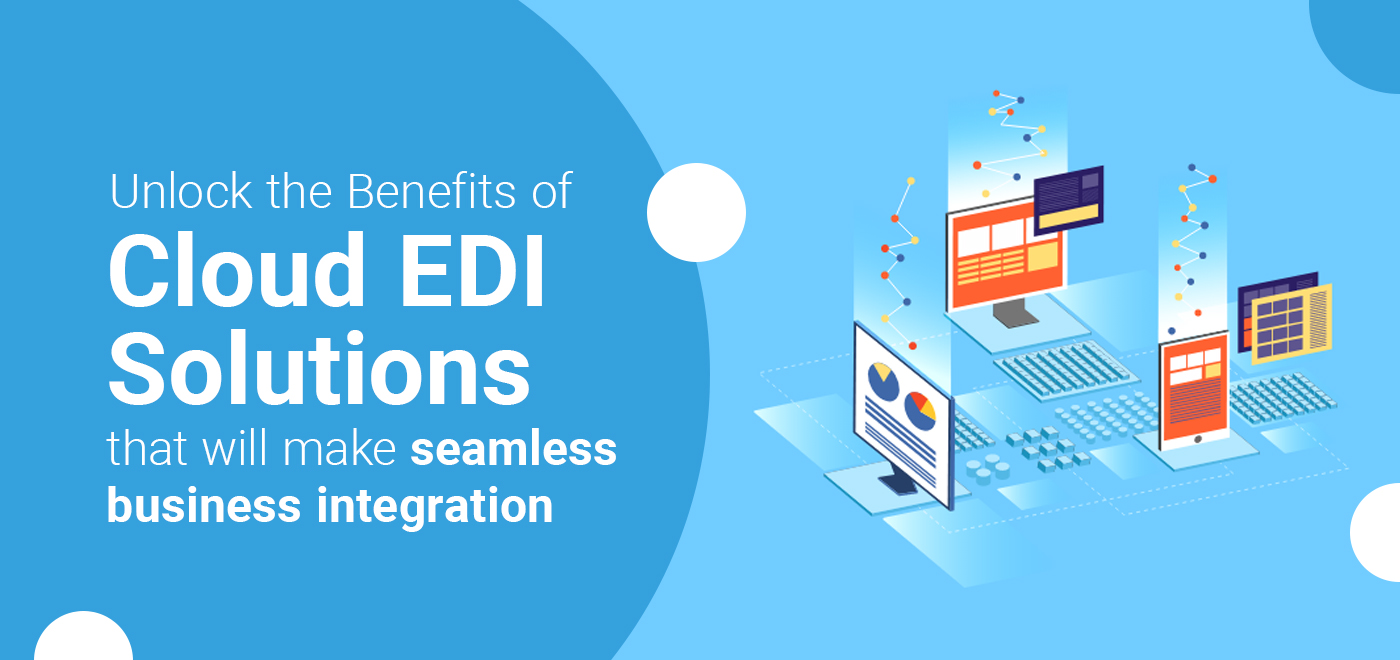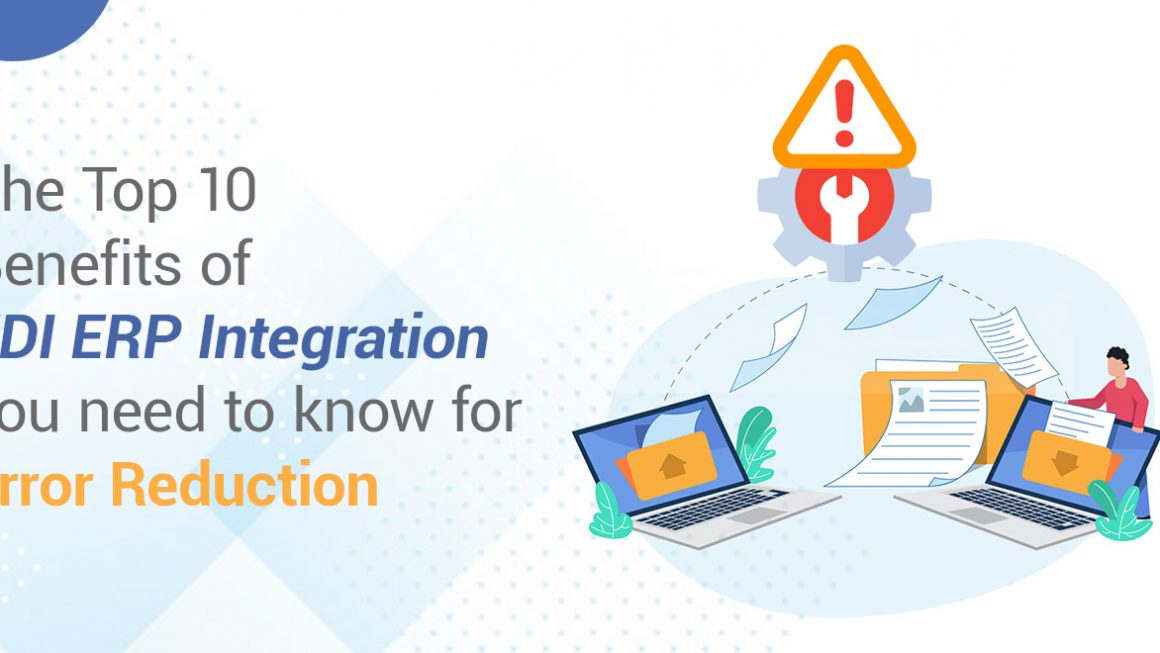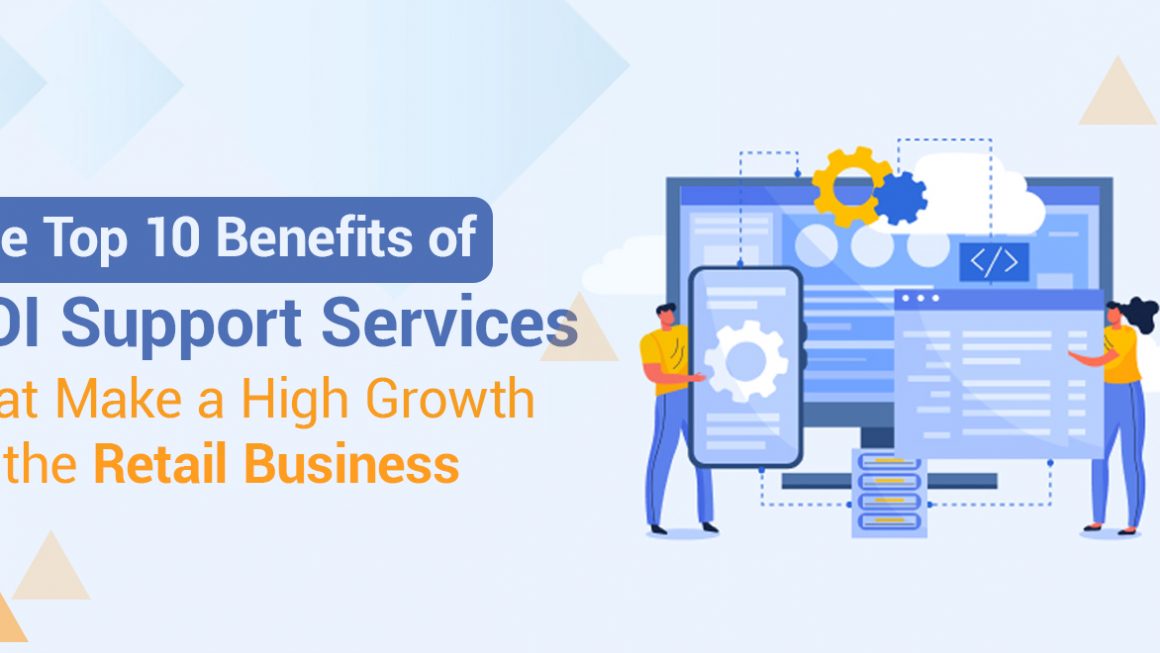The Cloud EDI Solutions in Business Integration highlights the advantages of using cloud-based Electronic Data Interchange (EDI) technologies, such as cloud EDI software and EDI cloud services, to streamline and enhance business operations. Cloud EDI solutions facilitate the automated exchange of business documents and data across various systems and stakeholders, including suppliers, customers, and partners, in a standardized format. This enables businesses to improve efficiency, reduce errors, and cut costs associated with manual and paper-based processes.
By leveraging cloud infrastructure, companies can enjoy greater scalability, flexibility, and accessibility, allowing for seamless integration with existing systems and the capability to adapt to changing business needs through cloud-based EDI. This approach not only streamlines operations but also supports better decision-making through real-time data access and enhances collaboration across the supply chain.
Key Benefits of Cloud EDI solutions
Cloud-based Electronic Data Interchange (EDI), also known as EDI cloud solutions, offers a transformative approach to managing and exchanging business documents and data through EDI electronic data interchange, providing a host of advantages that enhance operational efficiency and strategic capabilities.
Here are the key benefits:
- Scalability and Flexibility: Cloud EDI solutions can easily scale to meet the fluctuating demands of businesses, accommodating growth without the need for significant upfront investment in infrastructure. This flexibility allows companies to adapt to market changes and business needs swiftly.
- Cost Savings: By migrating to Cloud EDI solutions, businesses can significantly reduce costs associated with traditional EDI, such as on-premises hardware, software, and maintenance expenses. The pay-as-you-go model of cloud services also means that companies only pay for what they use, optimizing spending.
- Enhanced Efficiency and Accuracy: Automation of data exchange processes minimizes manual intervention, leading to a drastic reduction in errors and discrepancies. This not only speeds up transaction processing but also ensures the accuracy of data exchanged between business partners.
- Real-time Data Access and Decision Making: Cloud EDI solutions provides businesses with the ability to access and share data in real-time, enabling faster decision-making and more agile responses to market conditions. This immediate access to information is crucial for maintaining competitive advantage.
- Improved Security and Compliance: Designed with robust security, Cloud EDI solutions protect sensitive business data during transmission and storage. Businesses effortlessly meet their legal obligations as these solutions comply with industry standards and regulations.
- Seamless Integration with Existing Systems: Modern cloud EDI solutions can seamlessly integrate with a variety of business systems and applications, ensuring smooth data flow and reducing the need for manual data entry. This integration capability supports cohesive business processes and information consistency across departments.
- Global Accessibility: Cloud EDI solutions offer the advantage of accessibility from anywhere, at any time, through the Internet. This global reach is essential for businesses with distributed operations and partners, facilitating collaboration and communication across geographical boundaries.
How Cloud EDI Solutions Transforms Business Operations
The integration of Cloud Electronic Data Interchange (EDI) into business operations, often facilitated by an EDI consultant and supported by EDI support services, marks a significant shift towards more streamlined, efficient, and collaborative processes. This transformation touches various aspects of business operations, from supply chain management to customer relations, offering a comprehensive upgrade over traditional methods.
1. Streamlining Supply Chain Management
Cloud EDI solutions enable the seamless flow of information across the supply chain, ensuring that orders, invoices, and shipment details are exchanged in real time between suppliers, manufacturers, and retailers. This real-time data exchange reduces lead times, optimizes inventory levels, and enhances the visibility of supply chain operations. It will make it easier to identify bottlenecks and address them proactively.
2. Enhancing Data Accuracy and Reducing Errors
By automating the exchange of business documents, Cloud EDI solutions minimize human intervention, significantly reducing the risk of errors that can occur with manual data entry. Improved data accuracy leads to smoother operations, fewer delays, and reduced costs related to corrections and returns.
3. Improving Partner and Customer Relationships
The efficiency and reliability provided by Cloud EDI contribute to stronger relationships with business partners and customers. With accurate and timely information exchange, companies can meet their commitments more reliably, respond to partner and customer needs more swiftly. It provides a higher level of service, thereby enhancing satisfaction and trust.
4. Facilitating Regulatory Compliance
Many industries are governed by strict regulatory standards that dictate how data should be handled and exchanged. Cloud EDI solutions are often built with compliance in mind, offering features that ensure data is processed and stored according to industry-specific regulations, thereby easing the compliance burden for businesses.
5. Enabling Global Operations
The cloud-based nature of EDI solutions removes geographical barriers, allowing businesses to operate on a global scale more easily. Companies can connect with partners and customers worldwide, managing international transactions and data exchanges without the complexities and delays often associated with cross-border communications.
6. Accelerating Decision-Making Processes
Access to real-time data through Cloud EDI empowers businesses to make informed decisions quickly. This agility is crucial in today’s fast-paced market environment. Opportunities and challenges must be addressed promptly to maintain the competitive edge.
7. Driving Innovation
Cloud EDI empowers businesses, enabling a focus on innovation and strategic initiatives rather than operational inefficiencies. The insights gained from real-time data can also spark new ideas for products service. Business models, further driving growth and differentiation in the market.
Implementing Cloud EDI Solutions
Adopting Cloud EDI is a strategic move that can significantly improve business efficiency and connectivity. However, the transition requires careful planning and execution. Here’s a guide to implementing Cloud EDI solutions effectively:
Assessment and Planning
Begin by assessing your current EDI capabilities and business requirements. Identify the processes that will benefit most from Cloud EDI solutions and any specific compliance or integration needs. Develop a clear roadmap for implementation, including timelines, budgets, and key milestones.
Choosing the Right Cloud EDI Provider
Selecting the right EDI services provider is critical. Look for a provider with a robust platform that offers high reliability, security, and compliance with industry standards. Consider their experience in your industry, the scalability of their solutions, and the quality of customer support.
Integration with Existing Systems
One of the key advantages of Cloud EDI solutions is its ability to integrate with existing business systems, such as ERP, CRM, and accounting software. Work with your provider to ensure seamless integration, minimizing disruptions to your operations.
Data Migration and Testing
Migrating data to the new system is a sensitive step that requires meticulous planning. Ensure accurate data transfer. Thoroughly test the new system with your partners to confirm its expected functionality.
Training and Change Management
Change can be challenging, so it’s essential to prepare your team for the transition. Provide comprehensive training on the new system and processes. Effective change management practices can help ease the transition and ensure buy-in from all stakeholders.
Go-Live and Monitoring
Once you’re confident in the system and your team’s readiness, go live with your Cloud EDI solution. Monitor the system closely, especially during the initial stages, to quickly identify and resolve any issues that arise.
Ongoing Support and Evolution
After implementation, establish procedures for ongoing support and maintenance. Cloud EDI solutions evolve, so stay informed about updates and new features that can benefit your business. Regularly review your EDI processes and system performance to ensure they continue to meet your business needs.
Future Trends in Cloud EDI solutions
As we look ahead, several key trends are poised to further transform how businesses leverage Cloud EDI solutions for enhanced connectivity and operational efficiency:
Integration with Emerging Technologies
Cloud EDI solutions are set to become more intertwined with technologies like blockchain, Internet of Things (IoT), and artificial intelligence (AI). For instance, blockchain can enhance security and transparency in transactions. IoT devices can provide real-time data for more dynamic EDI exchanges. AI can predict and automate supply chain decisions based on EDI data insights.
Enhanced Data Analytics and Insights
With the vast amounts of data processed through EDI systems, advanced analytics will play a critical role in extracting actionable insights. Businesses will leverage this data to optimize their supply chains, forecast market demands more accurately and personalize customer experiences.
API Integration
The future of Cloud EDI solutions will see a greater emphasis on API (Application Programming Interface) integration. Enable more flexible and real-time data exchanges between diverse systems and applications. This shift will support more agile and responsive business models, allowing companies to adapt quickly to market changes.
Increased Focus on Security and Compliance
As cyber threats become more sophisticated, ensuring the security and compliance of EDI transactions will remain a top priority. Future Cloud EDI solutions will likely incorporate more advanced security measures, including end-to-end encryption and multi-factor authentication, to protect sensitive business data.
Global Standardization
Efforts to standardize EDI formats and protocols on a global scale will intensify, simplifying international transactions and reducing barriers for businesses entering new markets. This standardization will facilitate smoother trade and collaboration across borders.
Sustainability and Social Responsibility
With a growing emphasis on sustainable business practices, Cloud based EDI will be leveraged to support eco-friendly initiatives, such as reducing paper use and optimizing logistics to lower carbon footprints. Businesses will use EDI data to make more environmentally conscious decisions.
Democratization of EDI
Cloud EDI solutions will continue to make EDI more accessible to small and medium-sized enterprises (SMEs). Democratizing the technology that was once the domain of large corporations. This inclusivity will enable SMEs to compete more effectively on a global stage.
Conclusion
The integration of Cloud EDI solutions into business operations, often supported by EDI consulting services and specialized offerings like EDI 834 services, represents a significant leap forward in how companies communicate, exchange data and manage their supply chains. By leveraging the cloud, businesses can enjoy unparalleled scalability, flexibility, and efficiency, translating into tangible benefits. These benefits are cost savings, enhanced accuracy, improved partner relationships, and better decision-making capabilities. Future trends in Cloud EDI, including the integration with emerging technologies like AI, blockchain, and IoT, promise to further enhance its capabilities. Also offer businesses new opportunities for innovation and growth.
The Cloud EDI solutions stands out as a critical tool for businesses seeking to streamline their operations and stay competitive. Its ability to adapt to changing business needs, coupled with ongoing advancements in technology, makes it a sustainable and forward-looking solution. Businesses that embrace Cloud EDI will not only optimize their current operations but also position themselves to capitalize on future opportunities in an increasingly interconnected and digital global market. Cloud EDI solutions are more than just a technological upgrade; it’s a strategic enabler for business efficiency, connectivity, and growth. As we move forward, it will be exciting to see how businesses continue to innovate and transform their operations through the power of Cloud EDI.
FAQs
What is Cloud EDI and how does it differ from traditional EDI?
Cloud EDI (Electronic Data Interchange) refers to the use of cloud computing to facilitate the exchange of business documents and data between trading partners in a standardized electronic format. Unlike traditional EDI, which often requires substantial upfront investment in hardware and software. Cloud EDI is hosted on a service provider’s infrastructure, offering greater scalability, lower costs, and easier integration with existing systems.
What are the main benefits of implementing Cloud EDI in my business?
The primary benefits include cost savings by reducing the need for paper-based processes and manual data entry, improved efficiency and accuracy through automation. It enhanced scalability and flexibility to meet changing business needs, better decision-making with real-time data access, and stronger compliance with security and industry standards.
Can Cloud EDI integrate with my existing business systems?
Yes, one of the significant advantages of Cloud EDI solutions its ability to integrate seamlessly with various business systems such as ERP (Enterprise Resource Planning), CRM (Customer Relationship Management), and accounting software. This integration ensures smooth data flow and consistency across different departments and functions.
Is Cloud EDI secure and compliant with industry regulations?
Cloud EDI solutions providers typically implement robust security measures, including data encryption and secure data centers, to protect sensitive information. Additionally, these solutions are designed to comply with industry standards and regulations. Ensure that your business meets its legal and contractual obligations.
How can my business get started with Cloud EDI?
Getting started involves assessing your current EDI and business process needs, selecting a Cloud EDI solutions provider that aligns with your requirements, and planning the integration with your existing systems. It’s also important to consider the provider’s scalability, security, and support services. A phased approach to implementation, starting with key transactions or partners, can help ensure a smooth transition.



